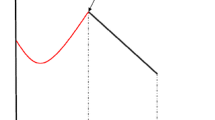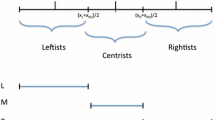Abstract
We extend the citizen candidate model of electoral competition with sincere voting to allow for k ≥ 2 states of aggregate uncertainty. We discuss and characterize the equilibrium set in this framework. We provide conditions for the existence of two-party equilibria when k = 2 and show that the policies of the two parties in any such equilibrium are not only divergent but that the parties are extremist: when the political mood is left-wing, the left-wing party wins decisively with a platform that is to the left of the left-wing median voter, while when the political mood is right-wing, the right-wing party wins decisively with a platform that is to the right of the right-wing median voter. We then provide conditions under which such equilibria remain robust for an arbitrary value of k.
Similar content being viewed by others
References
Besley T, Coate S (1997) An economic model of representative democracy. Quart J Econ 112: 85–114
Bernhardt D, Duggan J, Squintani F (2007) Electoral competition with privately-informed candidates. Games Econ Behav 58(1): 1–29
Brusco S, Roy J (2008) Aggregate uncertainty in the citizen candidate model yields extremist parties. Working Paper Series, 08-02, Department of Economics, SUNY at Stony Brook, NY
Calvert RL (1985) Robustness of the multidimensional voting model: candidate motivations, uncertainty and convergence. Am J Polit Sci 29(1): 69–95
Dellis A, Oak M (2007) Policy convergence under approval voting and plurality voting: the role of policy commitment. Soc Choice Welfare 22(9): 229–245
Duggan J (2005) A survey of equilibrium analysis in spatial models of elections. Rochester University, Mimeo
Duverger M (1954) Political parties. Wiley, New York
Eguia JX (2007) Citizen candidates under uncertainty. Soc Choice Welfare 29(2): 317–331
Fey M (2007) Duverger’s law without strategic voting. University of Rochester, Mimeo
Großer J, Palfrey TR (2008) A citizen candidate model with private information and unique equilibrium. California Institute of Technology, Mimeo
Osborne MJ (1993) Candidate positioning and entry in a political competition. Games Econ Behav 5: 133–151
Osborne MJ (1995) Spatial models of political competition under plurality rule: A survey of some explanations of the number of candidates and the positions they take. Can J Econ 28(2): 65–96
Osborne M, Slivinski A (1996) A model of political competition with citizen candidates. Quart J Econ 111: 65–96
Palfrey T (1984) Spatial equilibrium with entry. Rev Econ Stud LI: 139–156
Palfrey T (1989) A mathematical proof of Duverger’s law. In: Ordeshook PC (ed) Models of strategic choice in politics. University of Michigan Press, Ann Arbor
Riviere A (2000) ‘Citizen candidacy, party formation and Duverger’s law’, Dpe00/1. University of London, Royal Holloway
Roemer JE (1994) A theory of political differentiation in single issue electoral politics. Soc Choice Welfare 11: 355–380
Roemer JE (2003) Indeterminacy of citizen-candidate equilibrium. Cowles Foundation Discussion Paper 1410
Wittman D (1977) Candidates with policy preferences: a dynamic model. J Econ Theory 14: 180–189
Wittman D (1983) Candidate motivation: a synthesis of alternative theories. Am Polit Sci Rev 77: 142–157
Wittman D (1990) Spatial strategies when candidates have policy preferences. In: Enelow J, Hinich M (eds) Advances in the spatial theory of voting. Cambridge University Press, Cambridge
Author information
Authors and Affiliations
Corresponding author
Rights and permissions
About this article
Cite this article
Brusco, S., Roy, J. Aggregate uncertainty in the citizen candidate model yields extremist parties. Soc Choice Welf 36, 83–104 (2011). https://doi.org/10.1007/s00355-010-0467-4
Received:
Accepted:
Published:
Issue Date:
DOI: https://doi.org/10.1007/s00355-010-0467-4




